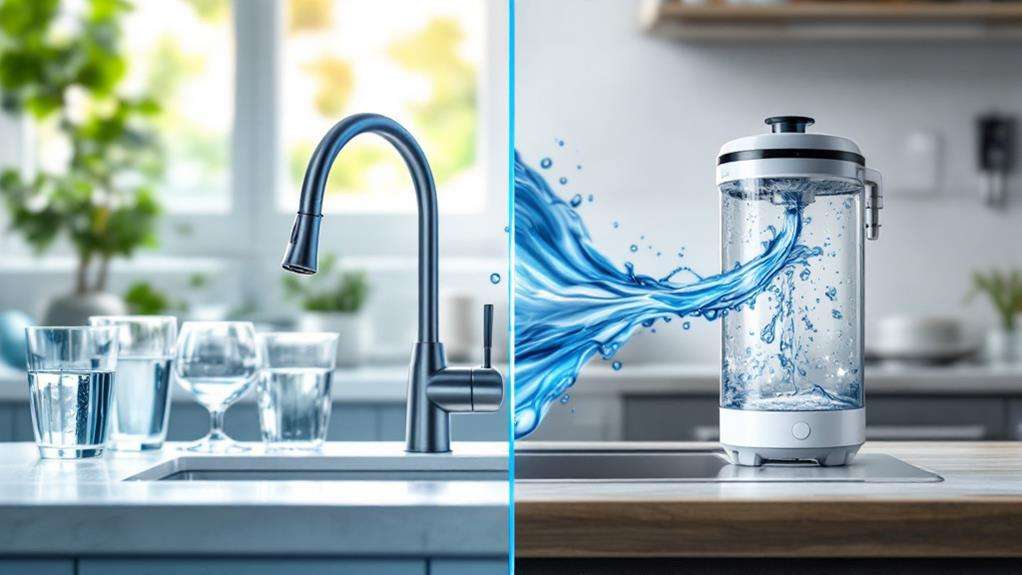Pros and Cons of Salt-Free Water Softeners
Salt-free water softeners offer eco-friendly benefits like no brine discharge and preserved minerals, along with low maintenance requirements. They're effective at preventing scale buildup in plumbing and appliances, potentially extending their lifespan. However, these systems don't actually remove calcium and magnesium, which means you may still experience some hard water issues. They can struggle with extremely hard water and may not provide the same level of soap lathering as traditional softeners. While they have higher upfront costs, they often require less ongoing maintenance. To make an informed decision, you'll want to weigh these factors against your specific water conditions and needs.
Understanding Salt-Free Water Softeners
Understanding salt-free water softeners begins with recognizing their unique approach to treating hard water. Unlike traditional salt-based systems, these water conditioners use template-assisted crystallization (TAC) technology to alter the structure of hardness minerals without removing them. This innovative method doesn't require salt or electricity and produces no waste brine, making it an eco-friendly option.
You'll find salt-free water softeners particularly beneficial if you live in an area with brine discharge restrictions. They can help reduce scale buildup in your plumbing and appliances, potentially extending their lifespan. It is crucial to recognize that these systems don't actually remove calcium and magnesium from your water. This means you might still experience some hard water issues, such as reduced soap efficiency and potential skin or hair problems.
Maintenance for salt-free water softeners is relatively simple, typically requiring filter media replacement every 2-6 years. However, assessing the effectiveness of the conditioning process can be challenging. When considering a salt-free system, weigh these factors carefully to determine if it's the right choice for your home's water treatment needs.
Advantages of Salt-Free Systems
Throughout the domain of water treatment, salt-free water softeners stand out for their unique advantages. Unlike traditional water softeners, these no-salt systems don't remove hardness minerals but instead alter their structure to prevent scale buildup. This approach offers several benefits that make them an attractive option for homeowners.
One of the most significant advantages of salt-free water conditioners is their low maintenance requirements. You won't need to worry about regular salt refills, which can save you time and money in the long run. Additionally, these systems operate without electricity, reducing your power consumption and potentially lowering your energy bills.
Salt-free softeners are also more environmentally friendly than their traditional counterparts. They don't discharge waste brine into the environment, making them a greener choice for water treatment. Conversely, these systems preserve beneficial minerals in your water, ensuring you don't lose out on essential nutrients.
Lastly, salt-free water softeners typically require less frequent filter replacements compared to traditional systems. This feature further reduces ongoing maintenance costs and makes them a convenient option for busy households looking to improve their water quality without the hassle of constant upkeep.
Drawbacks to Consider

While salt-free water softeners offer several advantages, they're not without their drawbacks. One significant issue is that these systems don't actually remove calcium and magnesium, the minerals responsible for water hardness. This means you won't experience the same level of soap lathering and detergent performance as you would with softened water from a traditional water softener.
Another concern is the potential impact on your skin and hair. The minerals left behind by salt-free water conditioners can lead to dryness and brittleness, which may be disappointing if you're expecting the silky-smooth feel of softened water.
It's also challenging to measure the effectiveness of salt-free water treatment systems. Unlike traditional water softeners, which clearly remove hardness, salt-free alternatives make it difficult to track their impact. This uncertainty extends to maintenance as well. You'll need to base your upkeep on scale buildup, which isn't easily monitored.
In areas with extremely hard water, salt-free water conditioners may struggle to prevent scale buildup as effectively as their salt-based counterparts. This limitation could lead to ongoing issues with your plumbing and appliances if not addressed properly.
Comparison With Traditional Softeners
When you're evaluating your options for water treatment, it is crucial to understand how salt-free water softeners compare to their traditional counterparts. The main difference lies in their approach to treating hard water. Traditional water softeners remove minerals through ion exchange, while salt-free systems alter the mineral structure to prevent scale buildup.
One of the most significant distinctions is the use of sodium. Traditional softeners require periodic regeneration with a sodium-based solution, whereas salt-free options operate without salt or electricity. This means you'll need to replenish salt regularly with a traditional system, potentially increasing operating costs.
Traditional softeners effectively remove calcium and magnesium but introduce sodium into your water. Salt-free conditioners, on the other hand, preserve the natural mineral content. This can affect the water's feel and quality, with salt-free systems maintaining a more natural presence of minerals.
When considering pros and cons, remember that traditional softeners may be more effective at preventing hard water spots, while salt-free options offer lower maintenance requirements. Your choice between these water treatment solutions will depend on your specific needs, preferences, and local water conditions.
Choosing the Right Solution

Choosing the right water softening solution can feel like traversing a maze of options. To maneuver this decision, you'll need to consider several factors, including your water hardness level, budget, maintenance requirements, and environmental impact. Salt-based and salt-free systems each have their pros and cons, so it's crucial to weigh them carefully.
Salt-free conditioners are ideal if you live in an area with brine discharge restrictions or want to avoid ongoing salt replenishment. They're also better for the environment and have lower long-term operating costs. However, they may not remove all hardness minerals as effectively as traditional softeners.
On the other hand, salt-based softeners provide more complete hard water treatment but require regular regeneration and can add sodium to your water supply.
To make an informed decision:
- Test your water quality to determine hardness levels
- Assess your budget for both upfront and long-term costs
- Consider your willingness to perform regular maintenance
Ultimately, consulting a water treatment specialist can help you determine the most appropriate softening system based on your specific needs and preferences.
